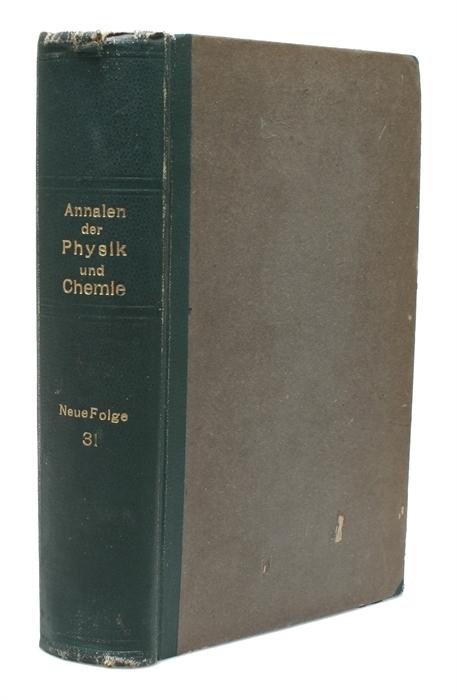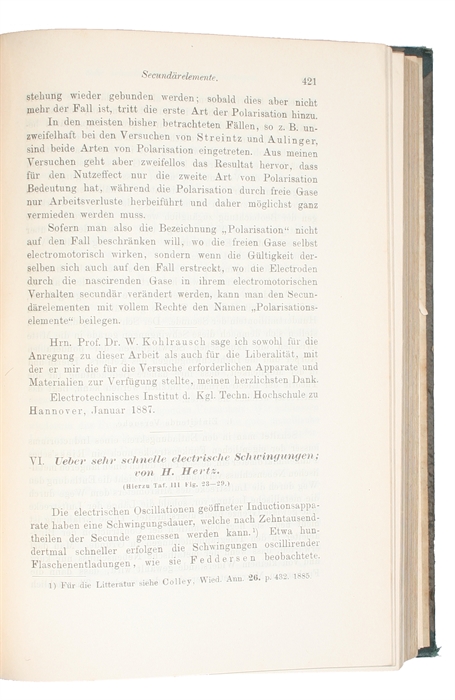THE ANTICIPATION OF WIRELESS TELEGRAPHY
HERTZ, H. (HEINRICH).
Ueber sehr schnelle electrische Schwingungen. (+) Nachtrag zu der Abhandlung über sehr Schnelle electrische Schwingungen (+) Ueber einen Einfluss des ultravioletten Lichtes auf die electrische Entladung.
Leipzig, Johann Ambrosius Barth, 1887. 8vo. Original half cloth with gilt lettering to spine. Library stamp to verso of title-page. In Annalen der Physik und Chemie, Neue Folge, Band XXXI. Pp. 421-448 + 1 plate; Pp. 543-544; Pp. 983-1000 + 1 plate. [Entire volume: VII, 1048 pp. + 7 plates]. Wear to capitals and two nicks (resulting in small holes and loss of paper) to back board. Internally nice and clean.
First edition of Hertz's seminal paper on electromagnetic waves in which he empirically demonstrates Maxwell's equations. This discovery and its demonstration led directly to the invention radio of communication, television and Radar.
Hertz demonstrates what Maxwell had predicted that electromagnetic waves radiated in space with the speed of light. Hertz determined these waves to be of greater length than light and that they could be reflected.
"Experimental proof by Hertz of the Faraday-Maxwell hypothesis that electrical waves can be projected through space was begun in 1887, eight years after Maxwell's death. The two main requirements were (a) a method of producing the waves, supposing that they existed, and (b) a method of detecting them once they were produced." (PMM, 377.). In the present paper Hertz "describes the apparatus that he had devised for the detection and measurement of electromagnetic waves, the key to his later success. To prove that electromagnetic waves can be projected through space it was necessary to devise a means of both producing the waves and, more difficult at the time, of detecting them once produced." (Norman Library, No. 1123).
"Hertz's researches on electrical waves vindicated the Helmholtz ideal of the physicist as one whose competences embraced both experiment and mathematics. Hertz entered physics at the right time for one of his abilities to make a critical contribution; because the outstanding problem of physics was the disorderly condition of electrodynamics, what was needed was someone with the theoretical power to analyze the competing theories and with the experimental judgment to produce the evidence that would persuade the physical community that a decision between the theories had been reached." (DSB, VI, 348b.)
In "Ueber einen Einfluss des ultravioletten Lichtes auf die electrische Entladung" Hertz describes for the first time in history the phenomenon that the sparking distances between two electrodes is increased when ultra-violet light falls on the negative conductor.
"In the early 1890's the young inventor Guglielmo Marconi read of Hertz's electric wave experiments in an Italian electrical journal and began considering the Possibility of communication by wireless waves. Hertz's work initiated a technological development as momentous as it physical counterpart." (DSB, VI, 349a.).
The present volume also contains the following articles of interest:
Bunsen, R. "Ueber das Dampfcalorimeter", 1-14 p.
Planck, M. "Ueber das Princip der Vermehrung der Entropie Zweite Abhandlund: Gesetze der Dissociation gasförmiger Verbindung", 189-203 p.
Hertz, H. "Nachtrag zu der Abhandlung über sehr Schnelle electrische Schwingungen", 543-544 p.
Hertz, H. "Ueber einen Einfluss des ultravioletten Lichtes auf die electrische Entladung", 983-1000 p.
Röntgen, W. C. & J. Schneider. "Ueber die Compressibilität von verdünnten Salzlösungen und die des festen Chlornatriums", 1000-1005 p.
See:
The Barchas Collection No. 982; The Haskell F. Normann Library No. 1123; Dibner, Heralds of Science No. 71; The Richard Green Library 204 p; Printing and the Mind of Man p. 227 (PMM 370 being Hertz' 1892 book).
Order-nr.: 42740


